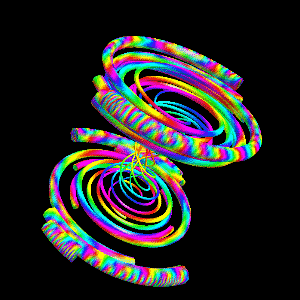SPEC’s ViewPerf - Data Explorer (DX-05)
A description from SPEC’s site:
“The IBM Visualization Data Explorer (DX) is a general-purpose software package for scientific data visualization and analysis. It employs a data-flow driven client-server execution model and is currently available on Unix workstations from Silicon Graphics, IBM, Sun, Hewlett-Packard and Digital Equipment. The OpenGL port of Data Explorer was completed with the recent release of DX 2.1.
“The tests visualize a set of particle traces through a vector flow field. The width of each tube represents the magnitude of the velocity vector at that location. Data such as this might result from simulations of fluid flow through a constriction. The object represented contains about 1,000 triangle meshes containing approximately 100 vertices each. This is a medium-sized data set for DX.”

The tests assume z-buffering with one light in addition to specification of a color at every vertex. Triangle meshes are the primary primitives for this viewset. While Data Explorer allows for many other modes of interaction, these assumptions cover the majority of user interactions.
There are 10 sub test in this viewset:
|
Test |
Weight |
DX functionality represented |
|
1 |
40% |
TMESH's immediate mode. |
|
2 |
20% |
LINE's immediate mode. |
|
3 |
10% |
TMESH's display listed. |
|
4 |
8% |
POINT's immediate mode. |
|
5 |
5% |
LINE's display listed. |
|
6 |
5% |
TMESH's list with facet normals. |
|
7 |
5% |
TMESH's with polygon stippling. |
|
8 |
2.5% |
TMESH's with two sided lighting. |
|
9 |
2.5% |
TMESH's clipped. |
|
10 |
2% |
POINT's direct rendering display listed. |
All tests were performed at 1280x1024 truecolor with Vsync off. The Lightscape profile was selected for the ELSA driver and the 3Dlabs drivers; the NVIDIA 3.65 driver did not have any such tuning options. The test results were:
|
DX-05 Weight: |
40% |
20% |
10% |
8% |
5% |
5% |
5% |
2.5% |
2% |
2% |
|
Composite |
|
Test # |
1 |
2 |
3 |
4 |
5 |
6 |
7 |
8 |
9 |
10 |
|
Score |
|
|
fps |
fps |
fps |
fps |
fps |
fps |
fps |
fps |
fps |
fps |
|
|
|
ELSA Gloria II SDR Quadro– ELSA Driver |
28.8 |
28.9 |
40.3 |
28.8 |
43.7 |
42.0 |
29.1 |
17.7 |
28.8 |
42.7 |
|
30.90 |
|
ELSA Gloria II SDR Quadro– NVIDIA 3.65 Driver |
29.6 |
29.9 |
38.9 |
29.4 |
42.0 |
42.6 |
30.2 |
18.4 |
29.7 |
41.3 |
|
31.44 |
|
CL Annihilator 256 SDR – GeForce |
29.8 |
30.0 |
39.3 |
30.2 |
42.2 |
41.8 |
29.7 |
18.3 |
30.1 |
42.0 |
|
31.62 |
|
3Dlabs GVX1 - AGP |
24.9 |
25.1 |
27.6 |
25.4 |
25.7 |
26.3 |
25.0 |
18.5 |
25.1 |
28.0 |
|
25.23 |
|
3Dlabs GVX1 - PCI |
16.5 |
15.2 |
16.5 |
14.2 |
15.2 |
16.5 |
16.6 |
16.4 |
18.2 |
14.2 |
|
15.97 |
|
3Dlabs VX1 |
12.8 |
13.3 |
16.2 |
15.2 |
18.1 |
14.5 |
13.0 |
9.76 |
13.6 |
24.0 |
|
13.82 |
|
Diamond Viper 770 Ultra - TNT2 |
16.9 |
10.6 |
22.8 |
10.8 |
13.5 |
19.8 |
15.5 |
5.03 |
17.7 |
13.2 |
|
14.68 |
The GLoria II (Quadro) and GeForce equipped cards scored about the same and were about 20% faster than the next best card, the GVX1-AGP. The GVX1-PCI was much slower than the AGP version of the same card. In fact the GVX1-PCI, VX1 and TNT2Ultra cards performed about the same on this test. Test data posted at the SPEC site shows that two of the higher end workstation systems, which use the Intergraph Wildcat 4110 and NEC TE4E graphic systems, score about 100% better than the GLoria II (Quadro) or GeForce.










0 Comments
View All Comments